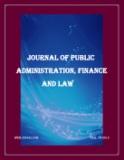SUSTAINABILITY OF PUBLIC FINANCE: EASTERN EUROPEAN COUNTRIES CASE
SUSTAINABILITY OF PUBLIC FINANCE: EASTERN EUROPEAN COUNTRIES CASE
Author(s): Daniel JuravleSubject(s): International relations/trade, Economic development, Public Finances, Fiscal Politics / Budgeting
Published by: Editura Tehnopress
Keywords: sustainability; TAR model; fiscal deficit; economic growth;
Summary/Abstract: The sustainability of fiscal deficits is of increasing importance for both the governors and theorists. This article analyzes the how the financial stability influences the economic growth in 4 East European countries for the period 1995-2018, using 6 macroeconomic variables: GDP growth, deficit, financial development, gross financial capital formation, inflation, population, trade. The methodology used is threshold autoregressive (TAR) models and through it is established for each country 2 thresholds for fiscal deficits. According to the analysis, the threshold values for the fiscal deficits that influence the economic growth are different for the linear part (between 2.12 for Bulgaria and 3.37 for Hungary) and the non-linear one (4.11 Romania and 4.33 Czech Republic). Any value of the deficit above this threshold produces a negative effect on the economy, and the lower values have a positive effect; the education for the political factors would be that the respective states must keep the deficit within the calculated limits.
Journal: Journal of Public Administration, Finance and Law
- Issue Year: 2019
- Issue No: 16
- Page Range: 97-105
- Page Count: 9
- Language: English

